EarlyEdition
Dietary Dilemmas: Solving the Puzzle of Early Childhood Nutrition
Befriending Numeracy in Early Childhood
Journey into Educational Leadership

Why


Befriending Numeracy in Early Childhood
Journey into Educational Leadership


ACA Qld
Location: 2/10 Welch Street, Underwood Qld 4119
Mailing: PO Box 137, Springwood QLD 4127
Telephone: (07)3808 2366
Toll Free:
1300 365 325 (outside Brisbane)
Web: www.qld.childcarealliance.org.au
Email: qld@childcarealliance.org.au
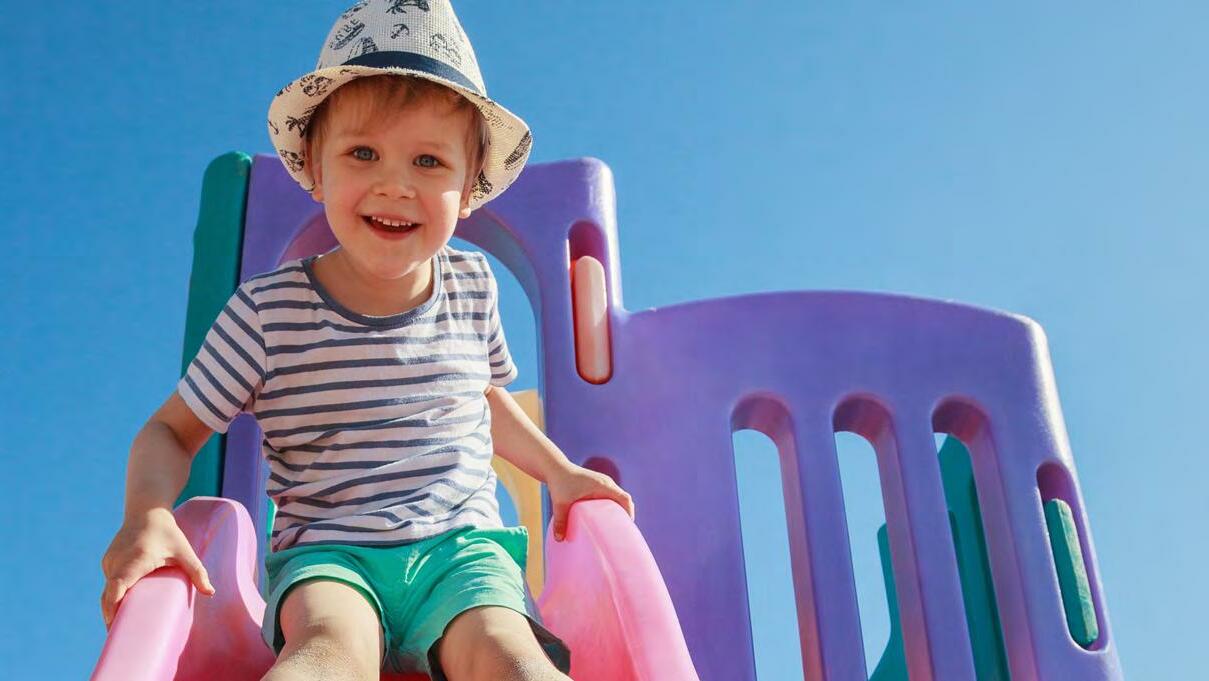
Executive President - Majella Fitzsimmons
Vice President - Jae Fraser
Treasurer - Louise Thomas
Executive Secretary - Debra North
Welcome to 2023. I hope you all had the opportunity to spend some quality time with your family and friends over the festive season. Time off is a great opportunity to reflect on the amazing work you do developing the young minds in your communities.
Since writing my President’s Report for the Spring edition it feels as though ACA Qld and the Committee have only been busier in advocacy and supporting members with their issues and concerns.
The committee has continued to lobby all sides of government to ensure the best outcomes for our children, to give them the best start in life.
I had the opportunity to attend the State Government’s Early Years Forum in November where the Minister for Education, Minister Grace Grace listened to the concerns of the sector and discussed the initiatives the Government were implementing. ACA Qld CEO, Paul Graham and I also had the opportunity to meet with Minister Grace to discuss, one on one, the issues concerning the sector, particularly the workforce shortages. It was pleasing to see that the Government has listened and extended the exceptional circumstances for a whole year which sees services not tied up in additional paperwork applications every 6 months.
We continue to work with Tania Porter, Deputy Director General of Early Childhood Education. ACA Qld Committee Member Brent Stokes, Paul Graham and I were invited to participate in the Workforce Forum. We even had several members attended including Anita Griffiths from Kids at the Beach, Bowen. In attendance were various Government departments and key stakeholders across the sector. All issues were put on the table including the workforce shortages and developing a 0-5 qualification with discussions on possible solutions following. We are looking forward to receiving the Department’s 5-year workforce plan that will come into effect in 2023.
Thank you to all our members who completed the many surveys that were forwarded to you in the last couple of months. The information gathered from these surveys has been vital. When speaking with Government they always go back to being able to produce facts and figures and give ‘real life’ evidence and these surveys are essential for us to continue our advocacy work with Government. Further surveys will be forwarded to you in the coming months, and we hope you can continue to support our advocacy work by completing these surveys.
ACA Qld has been actively working with the Department of Education to assist in the rollout of the Kindy for All funding for 2023. The rollout has involved working with the Department to deliver information sessions to Approved Providers regarding the funding and providing additional support through in-person meetings, telephone and email support. Thank you to Committee members Jae Fraser and Brent Stokes for delivering the information sessions in SouthEast Queensland. I have been actively meeting with members
in the north of the state. We have made ourselves available to answer any of your queries or concerns and we encourage services to call the office if they have any concerns with the funding or would like to meet to discuss further.
The Committee has recently spent two days meeting to plan for 2023 and beyond. We discussed and planned ongoing advocacy work and how to continue to improve the service to our members. We had some very robust conversations about how we can meet our strategic visions and goals of our membership. Thank you to all the Committee for volunteering the time out of their own businesses to continue to develop ACA Qld.
Registrations for the 2023 Conference at The Star Gold Coast are now open. Make sure you save the date in your calendar, 16-18 June 2023 and register for the event. 2022 sold out and our numbers this year will be capped, so make sure you register by 31 March 2023 to secure your tickets.
A big thank you to the College for Australian Early Childhood Educators (CAECE) team. They went above and beyond our expectations of trainers so that our ACA Qld members who were affected by the recent closures of training organisations were still able to have their staff assisted to complete their qualification or transition over to a new Registered Training Organisation. I am very proud that as an association, we were able to support members through this disruption. It has been a very big couple of months for the College as they have also successfully worked with their students and services to help students to complete their studies under the old qualifications. I am looking forward to seeing CAECE continue to grow and provide high quality training to our members.
A massive thank you to our amazing office staff, Paul, Jen, Kaitlyn, Hayley and Ebony. They have done an amazing job and we thank them for their outstanding and tireless efforts.
As always, I must give thanks to the wonderful volunteer committee members that sit and answer all questions and concerns and give up their time to ensure the best start for all Queensland children.
Majella Fitzsimmons ACA Qld President
The Federal Government continues to focus on the early learning sector as we enter the new year. Whilst it’s reassuring that our sector is recognised as playing an important role in giving our children the best start in life, as well as a critical factor in keeping the rest of the economy afloat, we need to ensure that any changes to government policy do not bring about unexpected consequences such as increased costs to families, or a destabilisation of the sector.
Our political engagement at the federal level allows for meaningful discussion with the key political stakeholders, to represent the needs of the sector and in particular the needs of our valued members.
In late November I spent some time in Canberra to actively speak to the key decision makers about the most pressing issues facing our sector. I met with the Hon Anne Aly MP, Minister for Early Childhood Education, as well as other influential MPs and Senators. We discussed the key issues facing our members and our families, including the current workforce crisis as well as the Secure Jobs, Better Pay Bill - the industrial relations reforms which include multiemployer bargaining.
These meetings went well and have galvanised our working relationships with our key stakeholders. The updates on the issues we discussed are outlined below.
Following Senator David Pocock’s suggested amendments being agreed to by Workplace Relations Minister Tony Burke, the amended Bill passed in Parliament and will take effect in mid-2023. ACA is working closely with our legal team at the Australian Business Lawyers & Advisors (ABLA) to explore the implications of this new legislation on our sector and will keep you informed.
As you would be aware, ACA is working relentlessly to address the workforce challenges faced by our sector. This is reflected in our political advocacy with government both face-to-face as well as via formal submissions such as our Employment Workforce Paper.
We have recently engaged a public policy consulting firm -Dandolo Partners - to help us undertake some research and develop some financial modelling, in order to get a better understanding of the impact of increased wages on affordability for families.
The project deliverables will greatly assist us in our political engagement and consultation activities with government around the impact of wage increases on our sector, especially for families. This research will take a few months to unfold. We will share the results of this study early this year.
Meanwhile we are extremely mindful of the Australian Competition & Consumer Commission (ACCC) Price Inquiry into Childcare and have therefore engaged law firm Clayton Utz to prepare some guidance around your legal rights and
obligations if, or when, you are contacted by the ACCC as part of their information gathering process.
This guidance will include information on how service providers can expect to be approached from the ACCC if they are contacted, what your legal rights and obligations are in the context of this information request, what level of information will be required and in what sort of format, what the expected timelines are, and what level of privacy will apply to the information you have provided.
Given that the ACCC is expected to commence their information gathering process at the start of the new year, we made this guidance available to you early December.
ACA will also provide a submission on behalf of the sector the ACCC as part of this inquiry, which will be one of our key policy items of focus for 2023.
We thank you again for your ongoing support as an ACA member, in providing meaningful feedback and remaining engaged with the critical issues impacting our sector.
Paul Mondo ACA President

When it comes to fuelling great nutrition, today’s early childhood sector faces more challenges than ever. So, how do you provide quality meals, day after day, amid ever-increasing staff shortages, allergies and inflation?
Around half of Australian children aged between two and five years of age attend centre-based care for an average of 31 hours per week, or almost four (eight-hour) days. While there, they should receive about half their daily nutritional needs during morning tea, lunch and afternoon tea – and even more if eating breakfast and a late snack in long day care.
That’s a big ask, and the flow-on effects are significant.
Staff vacancies in early childhood education and care have more than doubled in three years to reach record levels – and more than a quarter of Australia’s chefs were lost in the same period. Providing meals in early childhood services takes time and, in many cases, specialised skills. So it’s no surprise that these shortages, and the barriers to recruiting and retaining in-house chefs, make providing meals an intensifying headache for directors and educators alike.
Australian children have the highest prevalence of food allergy in the world. The incidence of severe food allergies has doubled just within the last ten years, so the experience of older generations differs significantly to what children, parents and early childhood educators must now manage. All that adds up to more stress for families –and childcare providers are at the frontline.
Higher food prices have become the norm as the impact of COVID-19 and more frequent natural disasters put grocery supply chains under pressure. Prices of food and nonalcoholic beverages as a group increased to 9.3% in the 12 months to August 2022, with prices rising across most food categories. In addition, researchers have recently discovered that children attending early childhood services in regional, rural or disadvantaged areas of Queensland are less likely to be provided with meals, compared than those
at centres in more affluent areas. Understandably, that can be about keeping costs down, however it often affects families who themselves find it hard to afford adequate amount of high-quality food for developing bodies.
What are the risks?
Food insecurity – or lack of access to sufficient, safe and nutritious food – can affect children’s health, development, behaviour and capacity to learn. Professor Karen Thorpe from the University of Queensland’s Brain Institute said recently that “without adequate nutrition it’s harder for children to learn and regulate their behaviour”.
As children are establishing their individual food preferences, what they eat now will also influence lifelong food habits and health. It is proven that poor dietary intake during childhood is likely to progress into adulthood and is linked to an increased risk of obesity and disease.

Unfortunately, the vast majority of Australian children do not meet the national recommendations for consumption of vegetables (99.6%) or lean meats and meat alternatives (99.3%); and girls under-consume dairy products (96.1%). Furthermore, Australian children receive almost 40% of their energy from discretionary foods and beverages, high in saturated fat, salt or sugars.

So, with all these pressures, what should you keep in mind when considering your own meal and nutrition solution?
More than ever, confident and meticulous allergy management is critical – and that’s where modern
technology is stepping up to the plate. Look for proven, complete and credible solutions that bring the peace of mind you need. For example, our own proprietary technology automatically analyses more than 107 allergen ingredients against individual dietary needs, generating tailored menu options including all their snacks with delicious, safe alternatives. All allergy-safe meals are individually sealed and labelled by child for peace of mind. Cross-contamination management in kitchens is a senior chef skillset and with increasing wages managing this risk appropriately is costly.
And with today’s critical staff shortages, investing in simplicity – ideally removing the need for specialised skills makes sense. Think easy heat-and-serve meals, clear instructions, complemented with fresh fruit, dairy and milk, and snacks – all pre-set in a daily menu. No need for commercial kitchens, professional kitchen staff, complex meal planning or worry about in-house chef absences. Most importantly, any children’s meal solution should be backed by expert understanding of specific nutritional needs and guidelines. Our menus are created by accredited practising dieticians alongside an expert team of chefs to balance optimal childhood nutrition with maximum appeal. They use fresh, natural ingredients to provide more than 50 per cent of a child’s recommended dietary requirements, more than half their daily serve of fruit and vegetables, and around 75 per cent recommended daily iron intake.
Finally, don’t be misled: new approaches don’t have to mean more expense. In fact, many of our client’s report saving up to $200 per day in labour costs as a result of using our meal solutions (based on cost modelling data for centres hiring full-time chefs).
There’s no doubt it’s all food for thought: but, rest assured, there are creative, high-quality and cost-effective solutions to today’s dietary dilemmas.
As an advocate for childhood nutrition and allergy management, we love sharing our expert advice and providing research-based support and information to caregivers and parents.
Check out our free resources at wellbeingfood.com.au
Numeracy along with oral language skills have a profound impact on one’s physical, emotional and psychological wellbeing and lifestyle outcomes. This reason alone prompts governments and educative environments to support better literacy and numeracy outcomes, though achieving such a milestone can be quite a challenge.
Numeracy is a subject in which many children consider themselves inadequate. For these (among other) reasons, children often avoid numeracy related tasks and/or state they cannot improve because there is a belief that numeracy competence and IQ are directly related. While IQ and aptitudes undeniably play a role, there are things that can be considered to support the advancement of numeracy skills and improve overall ability in this area.
It could be easy to overlook the importance of developing numeracy concepts in young children, yet it would be a disservice to the children in our care if we were to overlook an important fact – that being that numeracy concepts do

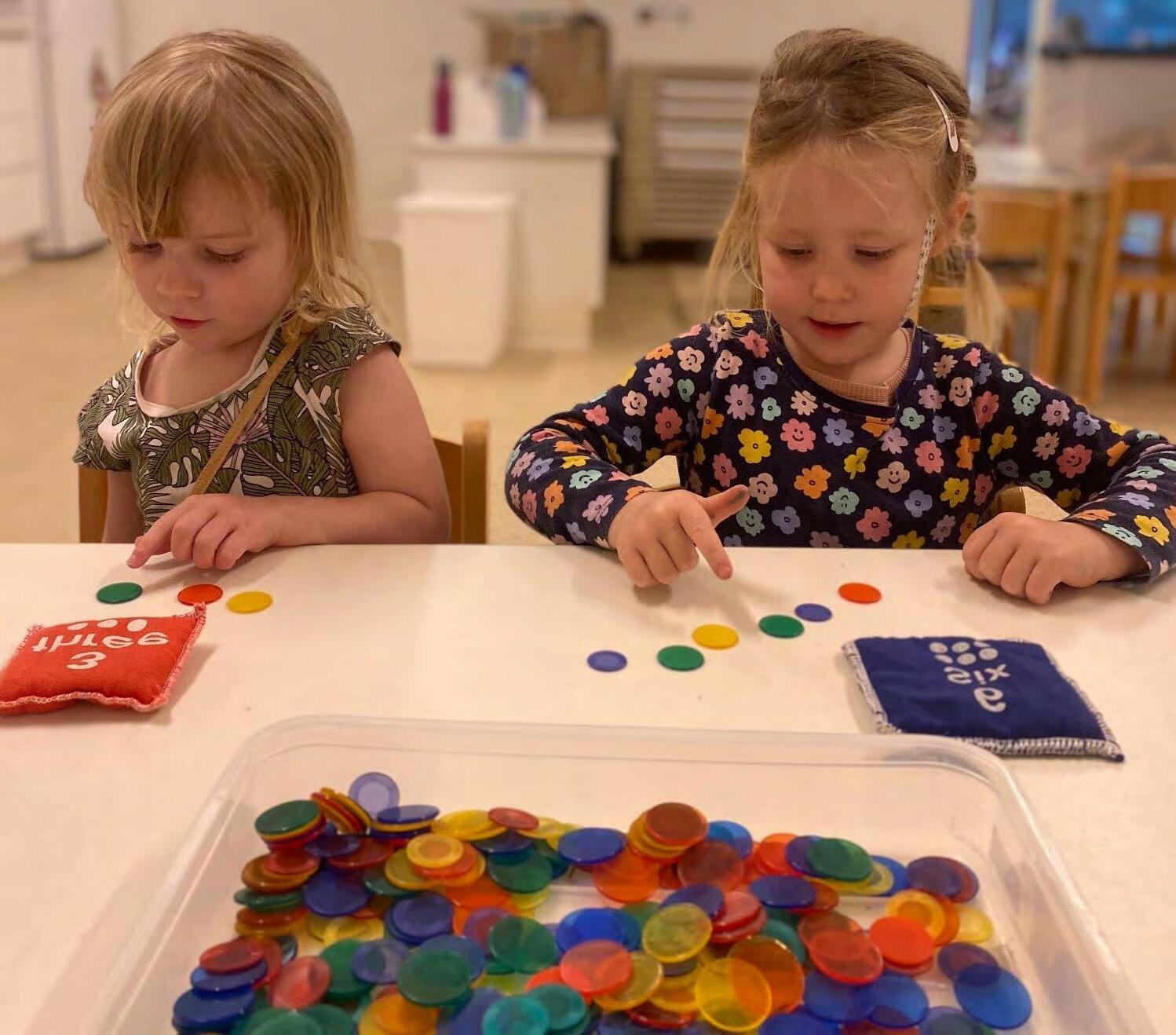
not exist in isolation but rather require the accumulation of skill and knowledge. Importantly, we must remember that everything children learn in the early years will help support and scaffold their future learning. Therefore, developing numeracy concepts in fun and playful ways can help support children’s later success when they reach their formal schooling years and beyond.
counting concepts imbedded in them, they ask about numbers when they see them, and they ask adults to listen to them count or read numerals. By playing dumb and counting or identifying a numeral incorrectly brings fun to the numeracy space and helps children feel competent and capable.
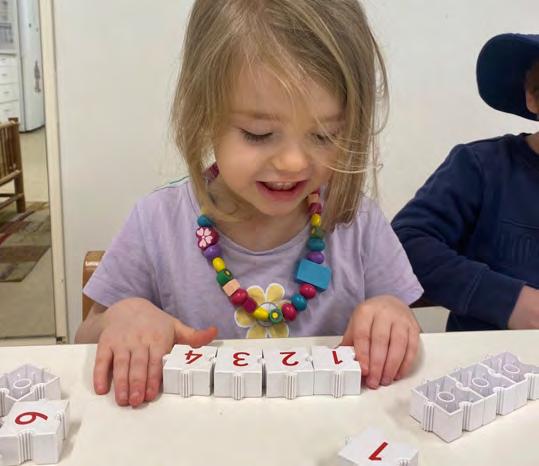
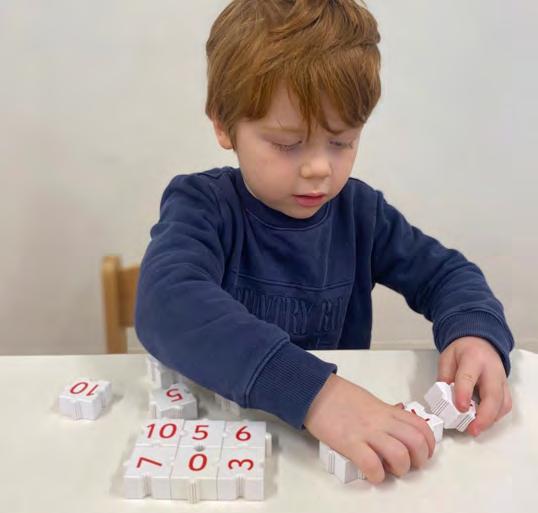
As an adult, it is overwhelmingly tempting to want to help children figure out ways to overcome the adversities they face, whether it be with their friends, when they are trying to build/construct something, or trying to figure out how something works. The child who is always helped will undoubtedly feel supported in that instance, however hidden problems can arise. When others fix their problems, they learn not to think for themselves. Instead of seeking a solution they wait for one, thus meaning that their brain lies dormant when it should not be. When problems occur, children who are encouraged to think outside the box (even when we can see that their efforts might not be successful), will be quicker to learn that there is more than one way to solve a problem. They will also learn how to run towards challenges/difficulties with an attitude of ‘I can’ rather than ‘I cannot’. A big part of numeracy is learning how to problem-solve, thus meaning that numeracy skills can be aided by simply asking children what they are going to do to overcome a problem rather than telling them how to do it.
Numeracy tasks are synonymous with provoking feelings of helplessness and anxiety. In extreme cases, it can lead individuals to avoid numeracy tasks and develop unfounded beliefs about their ability to be competent in this subject. While a formal diagnosis is needed to determine if a child is suffering from math anxiety, a diagnosis itself does not determine one’s inability to achieve in this subject and improve over time. Instead, like any emotions that provoke feelings of anxiety and worry, the trick is to learn how to calm oneself and instill a belief in the capability to overcome adverse situations, including those invoked by math-related tasks.
In order to calm oneself, it is important to avoid situations and/or behaviours that provoke more anxiety. Rushing children, comparing them to siblings or other children their age, and becoming flummoxed by the fact that children were able to complete a task one moment and not the next, will do little more than ensure feelings of anxiousness are prolonged. When thinking about the neurobiology of the brain, it is important to remember that any situation that creates stress will prevent individuals from being able to problem solve and access the knowledge they have already acquired to complete a task. Practicing a little equates to practicing a lot
Numeracy is everywhere and is connected to a lot of things we do. Practicing numeracy does not have to replicate a classroom environment. In fact, very young children are extraordinary when it comes to finding ways to practice math in their everyday lives, for example, they will count as they jump, they sing songs that have
Numeracy competence directly supports and can determine a child’s future adult successes. As such, it is a subject that holds grave importance. Teaching children how to problemsolve and engage in activities that promote mathematical concepts helps build knowledge and skill that they will later rely on when entering their formal schooling years. One of the best ways to teach children about numeracy is to embed it in programs and curriculums in playful, non-rushed, and repetitive ways that speak to the child’s natural way of being and learning. By adding the element of trust, whereby control and a belief that they are capable of figuring out the solutions to the problems they face, expands children’s ability to think numerically and believe in their capacity to succeed.
Early childhood education is essential in a child’s life assisting with enhancing their social and intellectual development while setting them up to be lifelong learners.
Edge Early Learning is a privately owned and operated company, established in 2017, with a rapidly growing number of centres across Queensland, South Australia and the ACT.
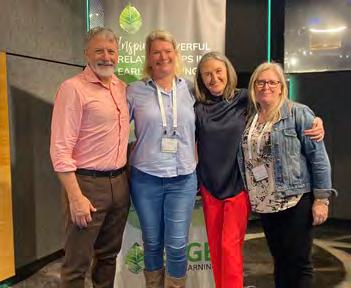
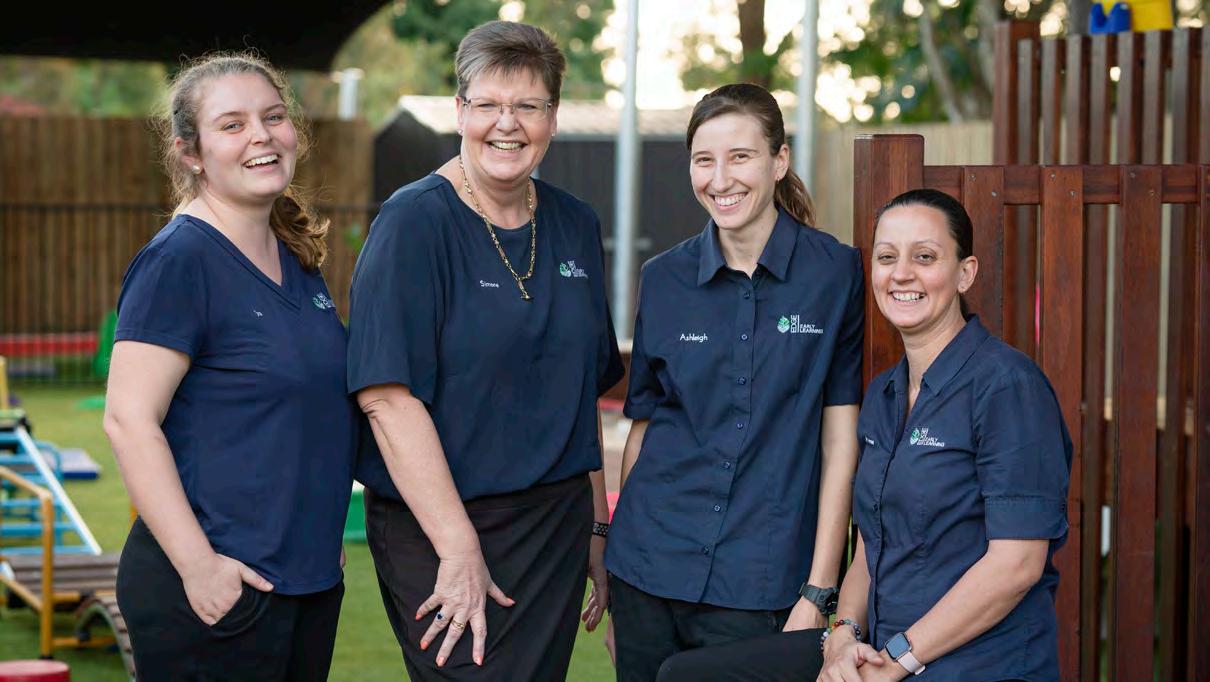
Providing quality education and care for children aged from 6-weeks to school age, Edge is committed to delivering an exceptional early learning experience so that all children in its care can discover their potential and start school with a love of learning.
Edge understands that for our youngest generations to have optimal learning outcomes and development opportunities, it starts with having the best on the frontline - their educators and employees.
Providing quality education and care for children is Edge’s main driver. But they are equally passionate about employing the right people for the job and believe this has set their foundation for high-quality centres with excellent team cultures.
“Our quest is to become Australia’s leading provider of early childhood education. We know in order to deliver the best quality education and care, we need to empower our educators,” Edge Early Learning CEO Annie Bryce said.
“We truly value our employees and constantly seek new ways to reward them. One of the many ways we do this is by providing our team members with the environment, resources, and support required to ensure children have access to state-ofthe-art learning opportunities tailored to their development.”
Here are some of Edge’s many initiatives in support of its educators and employees.
Liberating our leaders
As a team of lifelong learners, internal growth and development is a big part of the Edge approach.
The ‘Leading Edge’ program offers personal professional development to help Centre Directors learn and grow, and the team is constantly looking to – but not following– the industry to ensure it is leading the way.
In 2020, Edge launched its leadership program – created to provide support so that team members could regularly connect in order to share knowledge and updates, and empower each other to incubate innovation, strength and leadership within their individual teams.
Edge Centre Directors are given a platform to help shape Edge Early Learning as a whole, and their role goes beyond their own centre. Each month, Centre Directors are invited to come together and discuss key topics as part of monthly professional conversations. Topics covered are based on the 7 quality areas outlined in the National Quality Standards guide.
Edge Centre Directors also gather annually for an all-expenses paid weekend to connect and refresh, while gaining invaluable knowledge through inspiring workshops and motivational speakers.
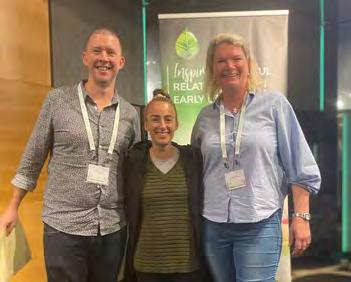

Over the past year, Edge has drawn 50 Centre Directors from across Australia –Queensland, South Australia, and the ACT – to congregate across a weekend together in Brisbane. It commenced with a leadership workshop that coached the Centre Directors on how to lead confidently and clearly, to drive team performance. The session was specifically tailored to their role and covered a range of topics from ‘moods and innovation’, ‘habits and way of being’, ‘listening beyond prejudice’, and ‘mobilising teams’.
participating in massive milestones daily. On the other hand, Centre Directors and Coordinators work in a leadership capacity, benefitting from the expertise and support of their Area Managers and the Support Office team.
Working at Edge is different from being employed by any other corporate company. Edge takes pride in ensuring all staff have a voice, suggestions are heard, there are multiple support pillars, and the entire network celebrates wins together. There are many perks for being an Edge employee, including 95% off childcare fees, an extra day of leave for your birthday, above award wages, school holiday leave for ECTs, full professional uniforms provided, an employee assistance program, and annual flu vaccinations. All Edge employees also receive a paid study time allowance and paid attendance for team meetings.
at the door. We love bringing people on who have different backgrounds, who might love yoga or cooking, for example, and we look to see how we can incorporate those interests into our centres to create rich educational experiences.”
Edge offers paid traineeships for those looking to enter the industry, and all roles are paid above-award wages. Leadership roles also receive monetary bonuses each quarter, and at the end of the year when the company’s Edgy Awards are announced, winners are rewarded with prizes of up to $1000.
Professional development isn’t limited, with each Edge leadership role having its own connection sessions where team members are encouraged to share ideas and continuously strive for greater outcomes in their roles.
Making a difference, together
No matter the role – Educator, Early Childhood Teacher, Centre Director, Chef, Support Office Employee –Edge’s diverse teams are all passionate about making a positive difference in young lives within communities and ensuring they get the best start in life.
Being an emerging company with more than 50 locations across Australia, Edge constantly has roles open and opportunities for career progression available.
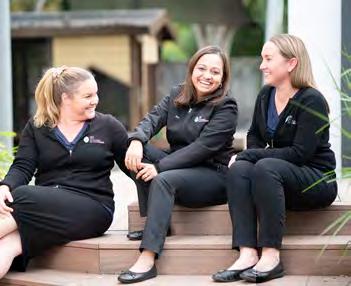
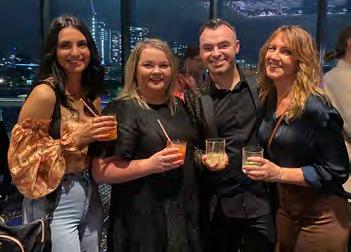
Edge Early Learning is an equal-opportunity employer that understands the importance of creating a diverse and inclusive work environment for its educators and families and encourage applications from people of all ages, nationalities, abilities, and cultures - committed to making reasonable adjustments to provide a barrier-free recruitment process. For more information on Edge Early Learning, visit www.edgeearlylearning.com.au
A career in childcare can be equal parts rewarding and challenging.
The benefits of a job in childcare can look very different depending on what role you take up. Educators work with and learn from children through Edge’s inquiry-based approach to educating, following the child’s interests to increase their curiosity and
“The wonderful thing about working in early learning is that it accommodates so many different kinds of people and encourages us all to play to our strengths,” Edge Early Learning
People and Culture Manager Peita Heintzberger said.
“And you don’t need to leave your prior skills, experience or passions

Marketing an early learning and childcare centre is a foreign concept for many owners and directors. But as more brand-new centres arise in the surrounding neighbourhoods and competition thickens, what can you do? If you are running a high-quality centre, but your enquiries are low, your tours are sporadic, and the new competitor’s car park is starting to look fuller at drop-off and pick-up times, it’s time to do something about it!
This is where marketing comes in. However, you may stare in bewilderment into the marketing world and not know where to start, let alone understand how it works. Some of the questions that run through people’s minds are: Does radio still work? Should we advertise in the newspaper? Those big billboards at $1000 per week must surely work? How about a flyer drop? And what about all those digital channels and social media like email, Facebook, Instagram, SEO, Google Maps, Video ads, Google My Business, websites, landing pages, Google Display, and so on? It can sound overwhelming but let me unravel this ball of mystical marketing and set a course towards those longlost enquiries, tours, and enrolments.
With the help of the internet and our friends at Google and Meta (Facebook and Instagram), you can now get your service in front of all those mums and dads looking for a centre right now or in the future. Is that all it takes, I hear you ask? Yes and no. First, let’s look at why a childcare centre is a little different when it comes to marketing. What’s the difference between childcare marketing and other industries?
Standard marketing tactics work well when you are dealing with products like the latest shoes, kitchen gadgets, or a 2-for-1 special on muesli bars at Woolies. But in the childcare and education space, we are dealing with people’s most prized possessions - their children! The
approach must be different. When people put their trust in your educators to care for and educate their children, a 2-for-1 promotion or a cheap and nasty offer will not cut it, and may also not be allowed under the changes to inducements for early childhood and care providers coming in from 1 January 2023. We are talking about building trust and reputation. And that is what creates your unique brand. Branding takes longer to develop, but it also lasts longer. There is no silver bullet with successful branding, but consistency is key. Your marketing is part of your branding.
Consumer behaviour has changed drastically these days, and this includes young parents. The internet and technology have influenced how we make choices and find information. Parents and carers nowadays search for information about the services available or interesting to them online. This means childcare owners and directors must meet their potential clients online and often begin building that trusting relationship in the digital realm. Digital marketing is the new way forward when it comes to promoting your childcare centre. Other sources are still useful at times, but nothing is as cost-effective as the digital marketing space these days.
The number one place to start is with Google Search adsthis is still number one as a marketing starting place. Right now, prospective families may be typing search terms like ‘childcare near me, kindergarten, early learning centre’ into their google search, and, for a small fee, your centre can be what those families will see first. Google has a cost-free support service to set up your first ad, and often you will receive a discount, too. Ads need to be kept up-to-date, and Google will recommend changes and updates you can make to improve your ad performance.
This is the beginning of your marketing journey. Here’s a short list of other marketing tools in order of importance:
1. Website – your website needs to be putting your best foot forward. Make sure it’s up to date and showcases how wonderful and unique your centre is.
2. Facebook & Instagram – Set up paid-per-click ads on both platforms.
3. Google Display – Set up paid-per-click ads. These ads show up when people browse various websites or play their favourite games on their smartphones.
4. Your Facebook or Instagram page – Regularly post organic content on your pages.

5. Google My Business Listing - Keep this updated. This is free, and you will be surprised how many enquiries you will get through this channel.

6. Local community Facebook groups – Join the local groups in your service’s area and keep an eye out for people looking for childcare.
You can do plenty more, but these suggestions will get you started. Just implement one at a time and build on it. If you are short of time or this still sounds daunting, get professional help to manage marketing for you. The above steps will get you started and improve your marketing results, but a professional should be able to get you more enquiries in a shorter time. There is a cost involved, but measured against each new enrolment, it outweighs the price. Just make sure that your digital marketers understand the intricacies of the early learning sector and can show a successful track record in this field. As mentioned before, early years education is about (little) people, not products, and your marketing needs to reflect that.
Andrew RileyAndrew is the founder and director of Childcare Marketing by Wave Digital - a boutique digital marketing company that only works in the childcare space.
Prior Street Child Care and Development were recently recognised by the Brisbane City Council as their 21st Waste Smart Kindy. In a ceremony at City Hall on Thursday 17 November, we won the Early Learning Centre category in the 2022 WasteSMART Brisbane Awards.
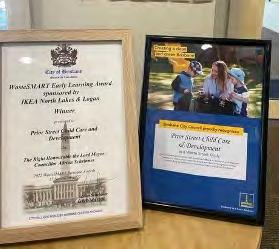

Here are justafew of our current embedded practices:
• A community Recycling Station.
• A recycling bin system in every room of the centre.
• Kitchen waste is redirected to 5 compost bins and worm farm.
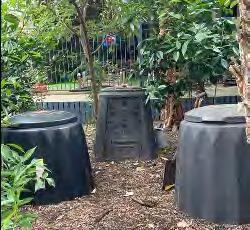
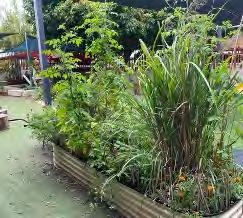
• We have bush tucker, fruit and vegetable and herbs gardens – with produce used in our kitchen or shared with families. Gardens support our native bees; while harvested seeds are recycled and shared.
• We have established an orchard with mulberries, oranges, limes, lemons. The children (and wider community!) eat fruit directly off the trees.
• We collect items for recycling through external organisations including batteries/pens/coffee pods/cans
• Our centre wide Bush Kindy program complements our commitment to caring for Country.

• Education and awareness is a key message in our programs. We participate in Planet Ark’s Recycling events and National Recycling week. We use donations from our recycling station; access Reverse Garbage for materials; and engage shows such as Recycle Man.
• All members of our team have completed professional development in recycling, composting, worm farms, reducing food waste, and managing waste.
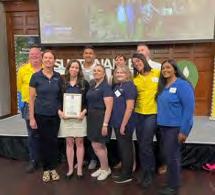
• We are proud to have been finalists in the 2020, and winners in the 2022, Brisbane City Council WasteSmart Awards. Our initiatives and commitment to sustainability was acknowledged in the Planet Ark School Recycling Right Competition.
We love to promote our waste smart messages and journey via various social media platforms. Instagram @prior_street_child_care and Facebook www.priorstreetchildcare.com.au
We have 4 compost bins, plus a worm farm and native bees. These 3 bins are located in our orchard.
Food is gathered off the fruit trees in the orchard – our babies love mulberries straight off the tree.
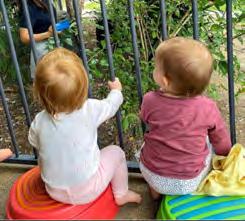
We have several gardens across the three outside play areas – bush tucker, fruit, herb, and floral for the native bees. We’ve also grown mushrooms and potatoes.
We use produce from the gardens in the kitchen, plus any excess is shared across the centre community, while seeds are harvested and recycled.
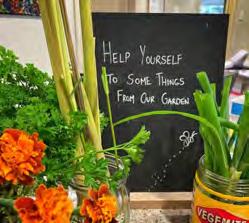
Fifty-four articles outline the rights of children around the globe. 54! That’s the number that the world agreed on.
I am an ambassador for Children’s Rights Queensland and an Educational Mentor, a mother to 4 children and a grandmother to 2. This gives me a responsibility to stand up and shout about children’s rights. However, when we reflect on the 54 articles that outline children’s rights, it doesn’t take a title or a position to be qualified to advocate for children’s rights. Quite the opposite, it takes everybody who has a chance to.
When should we advocate? When should we speak up? Where should we do this? And to whom do we speak? These questions leave even the most well-meaning of educators, teachers and adults silent. The overwhelming nature of how emotional and passionate we all are as adults working and caring for young children can sometimes render people frozen and not really knowing what to say or do.
The answer to the above questions is to advocate and speak up all the time, even when your voice is unsure. Do this everywhere, even when you face ridicule. And speak to everyone, even when it may feel like it is not your place to. Sometimes standing up for the little people, makes the big people uncomfortable, and that’s ok!
It is the small things done consistently over time that make a difference. When you feel the little voice that tells you that “this is too big for you to take on,” lean into that challenge. As an adult, the United Nations convention on the child’s rights is written for you to read and understand.

You are the one to make a difference. If it isn’t you, then who is it?
Grab yourself a copy of the United Nations Convention on the Rights of the Child and read the 54 articles. Or even have a look at the simplified version or child-friendly version. If you were to take one of these articles and consider how you could speak about it with others and how you could change one approach that you have with the children in your own life, or your organisation does, then this small step is one step closer for all of the children around the world to enjoy the rights that they are entitled to.
If you want to change the world, begin by doing one small thing to change what you do. What good is having an international agreement if no one lives it every day? Your small decisions make a big difference for the children of the world and, ultimately, all of our future. Collectively together, a trickle becomes a river, and the children of the future depend on you to be brave enough to stand up for their rights.
Mandy Alborn - Educational Mentor Ambassador for Children’s Rights QLD
When we think of philosophy, we usually picture some ancient person in a toga, or some esoteric individual upon a mountaintop, pondering obscure thoughts that have no practical use in our ‘real’ world. Philosophy, therefore, is usually seen as something distant to us with no reasonable uses. What if I told you, however, that philosophy can be of great benefit to your life. In fact, in an age of superficial motivational memes and ‘life hacks’, philosophy has become more important than ever. Not only in your personal life, but in your professional life as well. After all, reflecting on your pedagogy is a philosophical pursuit that you are already doing every day. Or at least should be doing. It even says so in the frameworks that guide you. These include Element 1.3.2 (Critical reflection) of the National Quality Standard (NQS), and Principle 5 (Ongoing learning and reflective practice) of the Early Years Learning Framework (EYLF).
The greatest philosophers, however, don’t tell you what to think, rather they try to teach you how to think. For instance, two and a half thousand years ago, a roundfaced, and flat-nosed Athenian wandered the streets of Ancient Greece. After finding an expert on a subject matter, he would initiate a conversation, and through dialogue, would illustrate where the expert’s knowledge is at times contradictory, and therefore erroneous. That man’s name was Socrates, and his dialogical method is known today as the Socratic Method. This involves scrutinising our current beliefs to determine their validity.
The Socratic Method can be undertaken in four steps:

1. Focus on a common belief.
2. Find an exception to that belief.
3. Reject the belief if an exception is found.
4. Re-formulate the belief to account for the exception.
Therefore, Socrates, did not teach a fixed philosophical doctrine, rather he taught us that we need to examine beliefs and practices, especially our own. After all, he did say that the unexamined life is not worth living.
Where Socrates maybe considered the father of Western Philosophy, modern philosophy is said to be attributed to the seventeenth century French philosopher and mathematician, René Descartes. If you have ever watched the movie, The Matrix, Keanu Reeves plays the character Neo, who attempts to save humanity from a simulation. Descartes was the ‘real world’ Neo, and what he realised is that knowledge could be doubted. Even our senses, which are for most part our primary mode of gaining knowledge of the world. For example, some dreams feel so real that when we are in them, we cannot distinguish them from real life. Therefore, how can we be sure we are not in some dream now? Or, have you ever thought you recognised someone until you got close enough to realise it wasn’t them? What Descartes realised is that he could doubt nearly everything, except for the fact that he was doubting (or thinking). Therefore, by virtue of doubting, the only thing he knew for certain is that he existed. Uttering perhaps the most famous phrase in all of philosophy, he says “I think, therefore I am.” This is known today as Cartesian doubt, and is considered to be the basis of our modern scientific method. Therefore, what Descartes is known for today is rationalism and deductive reasoning, where we examine the very nature of knowledge itself. So, where Socrates taught us that we should examine our beliefs, what we can learn from Descartes is that where we acquired our beliefs also need to be investigated. Therefore, reason can be at times more useful than our sensory experience, and as such, reasonable levels of doubt are important for critical thinking.
It is not just individual philosophers who change the course of history, but movements of philosophy as well. One French duo, Jean-Paul Sartre and Simone de Beauvoir realised that we are not fixed beings who are defined by our circumstances, rather we are freely able to choose. In fact, they believe choosing not to choose is also a choice. They also acknowledge that we need to remove any selfdeception, and make commitments to ourselves, and what really matters to us. Therefore, although we cannot always control the situation, they do believe we can control how we respond to the situation, even if its just the way we think about, and respond to it. As such, for Sartre and Beauvoir, our values, identity, and even our meaning in life are not predetermined. For them, we are choosing these things. There is no blue-print, and instead it is up to us to create ourselves. In fact, they believe we are already creating ourselves with every single decision we make (and every decision we do not make). Therefore, sometimes we may need to ask ourselves if we are the person we want to be, or are we just playing the part? Are we simply choosing to just go along with the flow and drift through life, feeling as though we have no control, or, are we going to take the reigns and guide ourselves to where we want to go, and become who we want to be.
With thousands of years of philosophy, we’ve only just scratched the surface of what the discipline has to offer us. What we can already find, however, is that we need to challenge our beliefs, and our practises, and take control of our lives. Above all, the important thing is that we do not stop thinking.
With play and early learning, comes, well, a happy mess. Can we help return your centre to its sparkling hygienically clean best every day?
We’re a hygiene and janitorial supplier that goes above and beyond to understand your centre’s needs. We’ve got you, and all the little hands too.
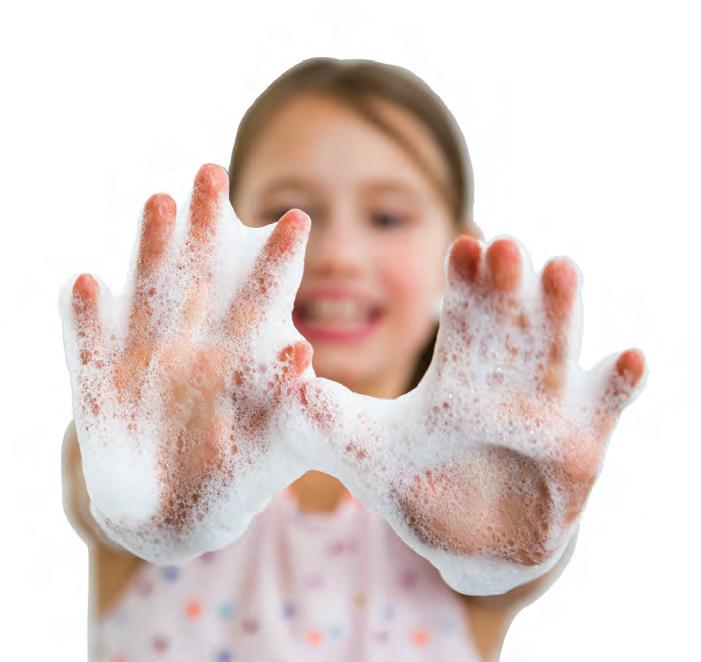
Mollard Property Group are niche-based specialist consultants in the design and development of high quality, innovative, compliant early learning centres. As supplier members of ACA Queensland, we are proud of our ongoing commitment and services to the sector. With an impressive track record of over 34 early learning centres projects in prime locations Australia-wide, with a 100% success rate on all our development approvals and planning permits on our completed projects.
The right location combined with innovative design excellence to the highest standard is becoming increasingly important in early learning centre development.
We understand location is critical to success, but bigger does not always mean better. While a bigger centre with more licensed places may sound good on paper it may not benefit your service. Often, developers will make a development site stack up financially by maximising the number of children the site can take, rather than considering the best outcome for specific business needs and operating services, which can result in failure.
In today’s competitive market, a successful early learning centre requires careful planning and innovative design, there are many aspects to consider including, architecture, landscape, functional interiors, cost-efficient construction, and sustainability – understanding each aspect is vital to ensure the feasibility of the centre and that the design will meet town planning and service approval requirements.
It’s important to understand the local catchment area to assess if a site is suitable for an early learning centre development prior to commitment. Our in-depth Site Suitability Analysis Report will assess the supply and demand, access, exposure, local competition, and financial viability for the appropriate number of children to uncover any potential issues with planning regulations ahead of time, avoiding costly mistakes.
We’ve been delivering outstanding early learning centres of all sizes for over a decade. Our knowledge and hands-on experience provide a different level of expertise to truly understand the critical balance between design and construction costs to meet the needs of the developer, proprietor, operator, council, parent, carer and, most importantly, child.

We work closely with our clients and consider how the early learning centre will operate, to design functional, safe, and fun environments that enhance the learning outcomes of the child and the wellbeing of staff, tailored to the client’s unique operational objectives, paying attention to every detail of the design to ensure its function, practicality and aesthetics compliment the location and surrounding properties whilst in compliance with the National Quality Framework.
We think outside the box to create exceptional innovative, sustainable spaces, designed to be the centre of attention, to deliver a point of difference in a competitive marketplace. From the initial planning stages to the end result, our team provide a complete, one stop consultancy service for the entire development process.
• Property Acquisition (Site Search and Identification)
• Site Suitability Analysis
• Childcare Modelling
• Project Establishment Analysis
• Property Leasing
• Centre Design and Design Management
• Interior Design and Specifications
• Development Managing (Planning Permit)
Whether you are looking to lease, develop and own a purpose-built centre in a prime location, or need design solutions to update your existing centre, contact the team at Mollard Property Group for an obligation-free consultation.
Receiving the accolade of ACECQA rating ‘Excellent’ is a laudable triumph, and the passionate team at Everton Park Child Care & Development Centre are one of only four services Australia-wide to achieve this three times in a row!
Two humble and insightful men, Owner Con Clifford, and Centre Director Jon Webb, lead an engaged and cohesive team of educators. Opening their service on Saturday 19 November 2022, ECEC colleagues were invited to visit the service, play in the space, experience the setting, and be engrossed in the service philosophy. The morning was spent absorbing the learning spaces, indoors and out. The Educators shared their stories of children’s participation in the program, of family engagement, and how embedding critical reflection was engrained holistically across the centre.
platforms high in the tree. A perfect lookout for a pirate, or a lazy spot to lay in the sun when the world below was too consuming. Jon took the time to discuss the benefits, expectations and parameters of risky play offered at Everton Park Child Care & Development Centre. He was purposeful in outlining the shared journey that educators and children go on throughout a year, where children are afforded opportunities to assess risk for themselves. The children experiment in safe space, understanding the boundaries both for themselves and others.
Meanwhile, a group of educators inside the kindergarten class observed a beautiful document aligning the QKLG, EYLF and indigenous ways of learning. Con explained that Natalie (Educator for Indigenous Learning) had developed it. He shared then how the children and Natalie had painted the outdoor dining table collaboratively. Jon added that the story told in the indigenous painting was about the children coming together in groups, learning, and growing, and then leaving with that knowledge. Poignant as those little artists graduate Kindy and head off to school!
any particular tree in the garden was planted and the names of the children who helped. As an owner Con facilitates a space where a culture of learning through play evolves intrinsically not just for children, but the adults too. This isn’t just a job, it’s not just what they ‘do’, but it truly is who they are!
ACECQA got it right! This centre is Excellent, and what makes it Excellent are the practices that occur every day, naturally and deeply embedded in the educators, parents, children, environment, and philosophy.
Congratulations Everton Park Child Care & Development Centre on your very deserved accolades and thank you for sharing the experiences of your service with the sector.
The wonderment could be seen in the eyes of the visiting ECEC educators as they wandered through the chook pen, past the vegie garden, to the tall jacaranda where pallets and ropes created
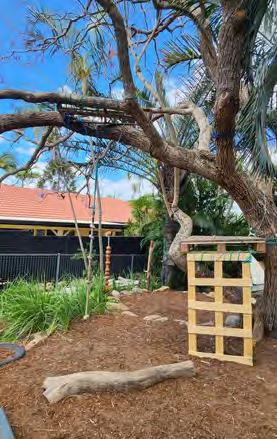
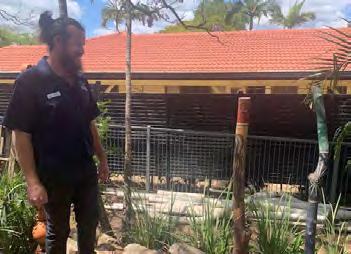
The setting cares for 80 children daily, in four classrooms of children aged 15 month and older. It feels like home, a sentiment shared by the families enrolled at the service. Most profound, and to their credit, was not the incredible outdoors, or the homely indoor facilities, but the passion. Every educator on the team has a sense of autonomy and ownership over the space, and Jon can tell you stories of the day

Playful teaching and learning are critical for developmentally appropriate ways to engage young children with language and literacy concepts in the prior-to-school years. In early childhood education settings, skilled educators locate entry points for meaningful language and literacy learning as children engage in various forms of planned and spontaneous play experiences across the day. Within these play experiences, a focus on oral language (speaking and listening) in the first five years leads the way for reading and writing following children’s transition to school.
Through play-based learning, children develop phonemic and phonological awareness, both of which are crucial for later reading and writing success. For phonemic awareness, children develop the ability to notice, think about and work with individual sounds (phonemes) in spoken words. For phonological awareness, children develop the ability to recognise and manipulate the spoken parts of sentences and words including identifying rhyming words, recognising alliteration, segmenting a sentence into words, identifying syllables in a word, and blending and segmenting onsetrimes. With a focus on oral language and sounds, phonemic and phonological awareness provide the necessary foundation for later formal learning around phonics which
incorporates print and the ability to apply knowledge of letter sounds to decode unfamiliar printed words. In early childhood education settings, repeated opportunity to engage children in singing, shared reading with a variety of texts, retelling stories with props and puppets, creating and talking about artworks and play processes, sound hunts, playing with words and rhyming games contributes to their phonemic and phonological awareness. Children’s oral language is also developed when open-ended resources are offered in play. Open-ended resources do not automatically signal what they do or what they’re for, meaning children need to talk, collaborate and experiment with peers when using these resources in play.

Other ways educators encourage oral language development through playful teaching and learning include:
• Facilitating environments for dramatic play where children can identify with different characters, roles and voices to understand how people use and manipulate language in society.
• Employing inquiry-based approaches for real-world and STEM-related projects to introduce new and distinct vocabulary which is meaningful to children’s investigations.
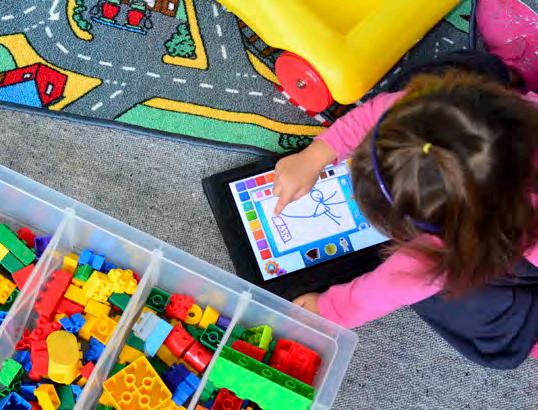
• Incorporating children’s home languages into the daily program, with dual-language books and recordings of favourite stories and songs by family members.
• The use of interactive apps such as Chatterkid that enable children to add a mouth and voice to any picture to support speaking and listening skills.
• Engaging children with obstacle courses and treasure hunts to support the development of directional language as they use their whole bodies to move around outdoor play spaces. Outdoor play equipment enables children to link words to physical objects and actions. Word association is integral to learning language and in later years, learning to read.
to comprehend what is being said, to take in curriculum content, follow instructions and understand what others are communicating to them. Researchers including Pamela Snow (2014) emphasise that strong oral language skills are one predictor of a child’s success in learning to read at school. Alongside oral language and sounds, early explorations of print should be encouraged, with meaningful engagement with emergent writing skills and printed materials through:
• Mark-making attempts, scribble and name writing attempts with a focus on emergent writing skills rather than perfected letter formation.
• Including environmental print relevant to the theme of dramatic play spaces such as universal signs and symbols (e.g., first aid, hospital, open and closed signs) and relevant texts such as magazines in a pretend hairdressing salon or doctor’s surgery.
• Children talking about and writing a menu for a pretend café, along with educators modelling writing by recording children’s contributions on a menu while saying, “slow down – you are talking faster than I can write!”
• Reading recipes together whilst cooking.
• Wondering out loud about punctuation marks in texts and showing fascination with how long the word “hippopotamus” is and how short “Anu’s” name is.
• Making your own alphabet books with the children’s drawings and/or photos of room resources.
• Supporting children to write signs saying “work in progress” for their creations not yet completed.
• Repeatedly focusing on a child’s name (and their friends’ names) as an essential connection between sounds in names and understanding about the corresponding letters/print.
Effective pedagogies also support children’s oral language development, including the use of questioning as a teaching strategy to discuss what is observed and to support analysis and evaluation in children’s responses. Marion Blank’s questioning framework provides one example of using levels of questioning to encourage children’s development of general language and vocabulary, as well as skills in comprehension, reasoning, inferencing, predicting and problem-solving. The teaching strategy of ‘sustained shared thinking’ supports adult/child and child/ child talk as educators and children work together in intellectual ways to solve problems, explore concepts and clarify understanding.
At school entry, children’s speaking and listening skills lead the way for reading and writing. In preparation for school, children need strong expressive language skills (speaking) to share their ideas, ask questions and communicate with others. They also need receptive language skills (listening)
Access to developmentally appropriate play-based approaches supports positive messages and attitudes about language and literacy learning. The challenge for early childhood educators is to provide rich opportunities that do not rely on formal and structured literacy learning but expose children to key elements of language and literacy through play-based mediums. When educators plan and design curriculum and environments meaningfully, they can trust that a play-based approach provides children with the skills and knowledge necessary for successful learning both now and following transition to school. This is particularly so for language and literacy learning in the prior-to-school years.
Blank M., Rose S.A., Berlin L. J. (1978a). The language of learning: The preschool years. New York, NY: Grune & Stratton.
Snow, P. (2014). Oral language competence and the transition to school: Socio-economic and behavioural factors that influence academic success. International Journal on School Disaffection, 11(1), 3-24.
 Audrey Azoulay
Audrey Azoulay
A professional journey always begins with a definition. We ask ourselves what is my role, and what is expected of me? ACECQA states that educational leadership is about driving change for the better. They go on to explain how educational leaders are agents of change on the journey to exemplary education and care (pg7).
When I was offered a role as educational leader in a centre where my early learning journey began, I was eager to return and explore what the role would look like in a 144-place long day care setting, after spending the last 12 years in a single unit community kindergarten as teacher/ director. Recent work with Australian Catholic University as a tertiary supervisor had opened my perspective and confidence in this type of mentoring role. I looked forward to the opportunity.
From the moment I started, the owner Janine was always available with insight into team members and the contrasts of working in long day care. Similarly, the director Kim was always available to discuss contexts, transferable skills of both educators and myself, and the bigger picture goals of the centre. Everyday I spent time building relationships with educators, setting realistic yet high expectations and actioning as much improvement as possible. Working in a larger team took me to unexpected places. During this time and through must reflecting I was becoming more aware of how my learning and working styles influenced how and what I did in this role. Similarly with the educators, in getting to know more about their philosophies and how it effected their programming style and workload management skills.
National Quality Standards outlines how educational leadership builds and promotes a positive organisational culture and professional learning community. NQS also states that the educational leader is supported and leads the development and implementation of the educational program and assessment and planning cycle. The guide outlines that the primary requirements of and educational leader role are to:
Here at Taigum Child Educare Centre the philosophy states “Together we are connected through our environment and community, with children and families”. It was obvious from the beginning that Together was a focus of understanding the role and on building team culture.
At Taigum Child Educare Centre we are continuing to value programs
“Rethinking education is more necessary than ever to give direction to the future”.
which are displayed in rooms and hands on child’s developmental portfolios. At the beginning of 2022, we had 3 amazing lead educators who were about to embark on their first experience leading a room. Together we met to discuss their strengths, experience so far and challenges of their new role. The face-toface collaborations helped me to understand that each educator is on their own professional journey and how we each have unique knowledge, ideas and systems of value.
Understanding each educator as an individual is important to understanding the culture of the team. All educators were interested in who I was and how I fit into the role as educational leader. Something which looks different in each centre and for each person who works in the role. In the early months I invested a lot of time meeting with educator’s face to face, both as non-contact time, in the rooms and surveys. The information I received then formed how my role looked and continued to evolve from week to week. What I discovered, is that behind the happy children, checklists, and well organised rooms are REAL people each have their story, experiences, ideas strengths, challenges, qualifications and philosophies. It is everyone’s role to work together to build a sustainable team culture which inspires the best education for early years education.
One of the challenges in the role was to find the balance between spaces for individual educator freedom and autonomy and providing families with information. The National Quality Standards requires a program plan (NQS 1.3.1) and information for families (NQS 1.3.3), yet no specifics are outlined. It is up to individual centres or educators to unpack what this looks like for their community.
Just as importantly it is the role of educational leaders to inspire educators to create a meaningful and realistic program and planning cycle. This looks different for each educator, and is influenced by new children enrolling, staff absences and changes, even the weather.
Throughout the year I also organised whole team training opportunities. An occupational therapist came into the centre to talk about sensory processing. Building our knowledge of both the developmental needs of young children and supporting the additional needs of some. In May we meet as a whole team to begin our journey into reconciliation. Unpacking Narra Gunna Wali and reflecting on what we know and what we want to know. Bringing the team together provides spaces to share their understanding and stories on the same topic.
of perspectives when supporting educators in their roles. To understand the pressures of a challenging day in a room with small children and helping educators find the balance between prioritising time with children and ensuring their paperwork was effective to their program and well communicated with families
On reflection the professional practice which I learned the most was the value of building team culture through shared ownership of responsibilities.

In conclusion, Educational Leadership is more than just checking the planning cycle and planning professional development. It is about nurturing a workplace culture where everyone has space to contribute, and everyone is valued for their unique contributions they bring to the team. There is still so much more to learn as our profession evolves and teams change.
References
ACECQA. 2019. The Educational Leader Resource. [online] Available at: https://www.acecqa.gov. au/sites/default/files/2019-03/ TheEducationalLeaderResource.pdf [Accessed 8 December 2022].
Educational leadership is more than just checking intentional teaching plans and following children’s interests. It is about valuing the uniqueness of each educator as an individual. Just as we do with children an inspiring and motivating educator to be the best they can be.

After attending the Seaman and Slattery Leadership conference in June my takeaway lesson was to make space to see the diversity
ACECQA. 2020. Guide to the National Quality Framework. [online] Available at: https://www.acecqa.gov.au/sites/ default/files/2020-01/Guide-to-theNQF_2.pdf [Accessed 8 December 2022].
United Nations, 2015. Transforming Our World: The 2030 Agenda for Sustainable Development. New York: UN Publishing.
Exploring immediate and long-term solutions for the challenges faced by the Early Years sector
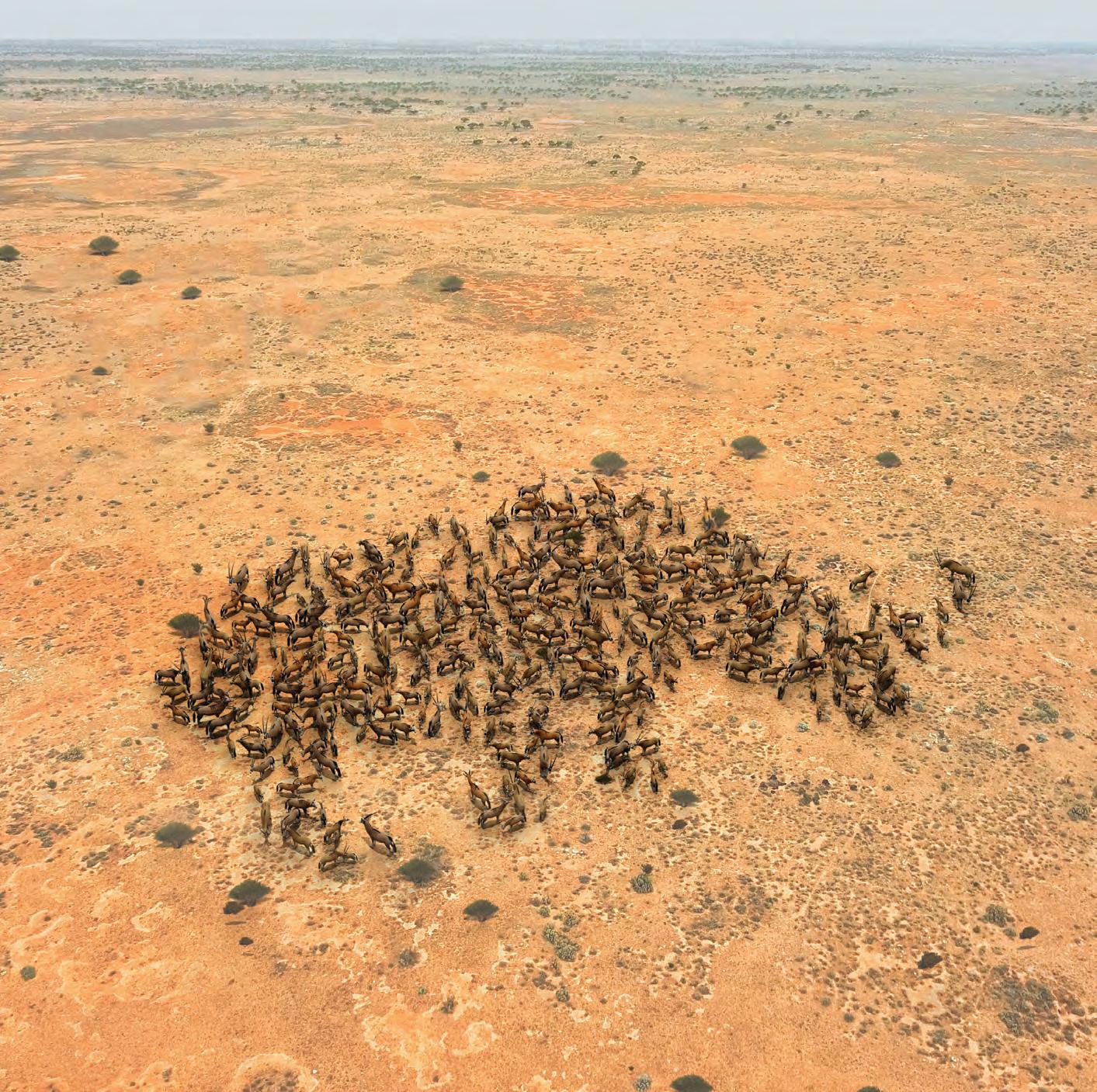
There’s safety in numbers. And with safety comes confidence; the confidence to keep moving forward, especially in your career. At Guild, we’ve dedicated the last 60 years to building a network of professionals to provide the support to help you leap higher.
Through our partnership with ACA QLD, we’ve been able to help grow the network that’s dedicated to protecting you and safeguarding the future of your profession.
Whatever journey you decide to take, and whatever stage of your career you’re at, we’re here so that you don’t have to face your challenges
alone. We may not be front of mind, but we’ve got your back when you need us most. Because when you’re a part of Guild, you’re part of something bigger. Find out more and get a quote today by visiting guildne.ws/early-learning or calling 1800 810 213
CAECE is delighted to present recent graduates who have completed their Certificate III in Early Childhood Education and Care and Diploma of Early Childhood Education and Care.

Over the last quarter we have had the opportunity to congratulate CAECE graduates from both our Diploma and Certificate III qualifications. With the ongoing support from our lovely CAECE trainers, students have been guided to achieve their goals in becoming fully qualified educators.
If you, or someone you know, are interested in studying and working towards your qualifications in early childhood education and care, our friendly staff and trainers are willing to guide and support your early learning journey! For more information please contact our team on 07 3299 5784 or email contact@caece.com.au
CAECE would like to congratulate the following graduates for the last quarter and wish them all the best for their future as an early learning educator!
Abbie: Coomera Clubhouse for Early Childhood Learning - Certificate III (Trainer Sonja Hartley)
Abigail: Caboolture Christian Children’s Centre - Certificate III (Trainer Lauren Turrell)
Abiol: Redbank Plains Child Care Children’s Centre - Certificate III (Trainer Meaghan Westwood)
Adrian: Little Scholars School of Early Learning Yatala - Certificate III (Trainer Melissa-Ann Cooper)
Alanna: Bahrs Scrub Early Learning Centre - Certificate III (Trainer MelissaAnn Cooper)
Alexandra: Busy Bees MitcheltonDiploma (Trainer Lauren Turrell)
Alicia B: Kidz at the Beach - Diploma (Trainer Mandy Walker)
Alicia M: Kids Club Darra - Certificate III (Trainer Meaghan Westwood)
Alisha: Living Faith Early Learning Centre Murrumba Downs - Diploma (Trainer Lauren Turrell)
Aliyah: Little Scribbles Early Learning Southport - Certificate III (Trainer Sonja Hartley)
Alyson: Bahrs Scrub Early Learning Centre - Certificate III (Trainer MelissaAnn Cooper)
Alyssa: Bayside Community College Early Childhood Centre Inc - Certificate III (Trainer Brooke Kirkham)
Amber: Little Munchkins Early Learning Centre - Certificate III (Trainer Sonja Hartley)
Amelia: Elephas Education Loganholme -Diploma (Trainer Melissa-Ann Cooper)
Amy: Loving Hearts Currumbin ValleyDiploma (Trainer Sonja Hartley)
Anaseini: Kingston Tiny Tots Early Learning Centre - Diploma (Trainer Brooke Kirkham)
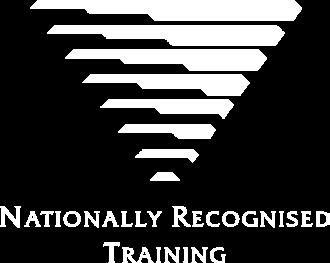

Angela: Petit Early Learning Journey Burdell 2 - Diploma (Trainer Lainie Randell)
Ann-Marie: Rosewood Early Education Centre and Preschool - Certificate III (Trainer Kellie Saville)
Apryll: Little Scholars School of Learning Burleigh - Certificate III (Trainer Sonja Hartley)
Becky: Calvary Early Learning CentreDiploma (Trainer Lainie Randell)
Bridgette: Expeditions Early Learning Journey North Lakes - Diploma (Trainer Lauren Turrell)
Britney: Runaway Bay Kindyland -Diploma (Trainer Sonja Hartley)
Brooke: Harbour Town Kindyland -Diploma (Trainer Sonja Hartley)
Callyda: FK Gardner & Sons - Diploma (Trainer Kellie Saville)
Cassidy: Kindred Early Learning Centre - Certificate III (Trainer MelissaAnn Cooper)
Catherine: Coomera Clubhouse for Early Childhood Learning - Certificate III (Trainer Melissa-Ann Cooper)
Chantelle: Nottingham World of Learning - Certificate III (Trainer Arielle Waples)
Charlie: Green Leaves Early Learning North Shore - Diploma (Trainer Lainie Randell)
Charlotte: Bright Horizons Australia Childcare Ormeau Ridge - Diploma (Trainer Sonja Hartley)
Chen-Chia: Autism QueenslandDiploma (Trainer Mandy Walker)
Cheyenne: Busy Bees MitcheltonDiploma (Trainer Lauren Turrell)
Chloe A: Tugun Tiny Tots Early Learning Centre - Diploma (Trainer Sonja Hartley)

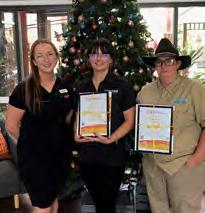
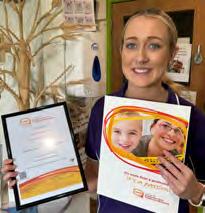
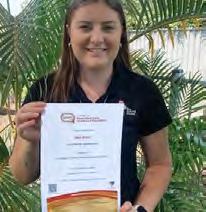
Chloe B: Lady Gowrie Kennedy Place Early Childhood Centre - Diploma (Trainer Lainie Randell)

Chloe G: Imagine Child Care and Kindergarten - Diploma (Trainer Lauren Turrell)
Chloe L: Tiny Tots Early Learning Centre Carrara - Certificate III (Trainer Sonja Hartley)

Chloe O: Little Bunyas Early Childhood Centre of Excellence - Diploma (Trainer Melissa-Ann Cooper)
Chloe S: Fairfield Waters Early Learning
-Diploma (Trainer Lainie Randell)
Courtney: Goodstart Early Learning Churchill - Diploma (Trainer Meaghan Westwood)
Daisy: Educating Kids Childrens Centre Townsville - Diploma (Trainer Lainie Randell)
Dana: Raceview Kindergarten and Child Care Centre - Diploma (Trainer Meaghan Westwood)
Danielle: Kingston Tiny Tots Early Learning Centre - Certificate III (Trainer Brooke Kirkham)
Dannielle: Little Scholars School of Learning Burleigh - Diploma (Trainer Sonja Hartley)
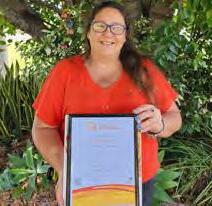
Deborah: Free Range Kids Gatton
-Diploma (Trainer Kellie Saville)
Devi: Citipointe Childcare - Certificate III (Trainer Brooke Kirkham)
Dianna: Greenslopes Early Learning Centre - Diploma (Trainer Arielle Waples)
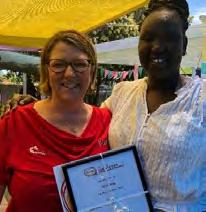
Dianne: Carinbundi Kids Family Day Care - Diploma (Trainer Lauren Turrell)
Dora: Piptree Early Learning Mount Gravatt East - Certificate III (Trainer Arielle Waples)
Eden: Miniversity Early Learning Centre
-Certificate III (Trainer Lainie Randell)
Ella A: Storyhouse Oak on Jellicoe Toowoomba - Diploma (Trainer Kellie Saville)
Ella C: Willow Early Learning Centre
Arundel - Certificate III (Trainer MelissaAnn Cooper)
Ella R: Bay House Early Education
-Certificate III (Trainer Brooke Kirkham)
Elspeth: Eastwood Early Education
-Diploma (Trainer Kellie Saville)
Emily C: Ascot Kindergarten and Childcare - Diploma (Trainer Brooke Kirkham)
Emily K: Little Scholars School of Early Learning Ormeau - Certificate III (Trainer Melissa-Ann Cooper)
Emily S: Stretton Early Years and Kindergarten - Diploma (Trainer Arielle Waples)
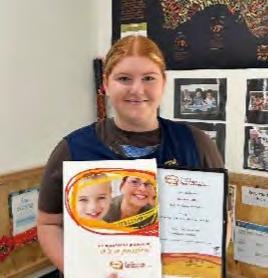
Emma C: Petit Early Learning Journey Burdell - Diploma (Trainer Lainie Randell)
Emma S: Piptree Early Learning
Mount Gravatt East - Diploma (Trainer Arielle Waples)
Emma T: Junior Campus Southport -Diploma (Trainer Sonja Hartley)
Emma Tr: Little Characters Early Learning Centre - Diploma (Trainer Lauren Turrell)
Erin: Busy Bees Mitchelton - Diploma (Trainer Lauren Turrell)
Fetoai: Redbank Plains Child Care Children’s Centre - Diploma (Trainer Meaghan Westwood)
Francis: Little Legends Early Learning Centre - Diploma (Trainer Lauren Turrell)
Fusi: Piptree Early Learning Mount Gravatt East - Certificate III (Trainer Arielle Waples)
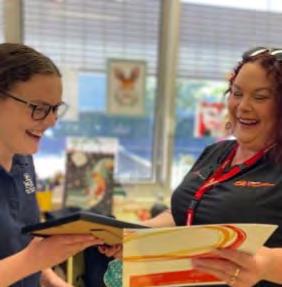
Gabrielle: Genius Early Learning Centre Wulguru - Certificate III (Trainer Lainie Randell)
Georgia: Unicare Centre - Diploma (Trainer Lainie Randell)
Hayley: Little Bunyas Early Childhood Centre of Excellence - Certificate III (Trainer Melissa-Ann Cooper)
Hollie: Little Scholars School of Early Learning Nerang - Certificate III (Trainer Pauline Bailey)
Jade: Good Life Kindergarten and Child Care Park Ridge - Diploma (Trainer Meaghan Westwood)
Jasmine F: Little Scholars School of Early Learning Ashmore - Diploma (Trainer Sonja Hartley)
Jasmine S: Educating Kids Childrens Centre Domain - Diploma (Trainer Lainie Randell)
Jayde: Petit Early Learning Journey Burdell - Certificate III (Trainer Lainie Randell)
Jaymee: Smart Start Early Learning Centre - Diploma (Trainer Meaghan Westwood)
Jennifer C: Little Scholars School of Early Learning Yatala - Certificate III (Trainer Melissa-Ann Cooper)
Jennifer W: Mundubbera Family Day Care Scheme - Certificate III (Trainer Mandy Walker)
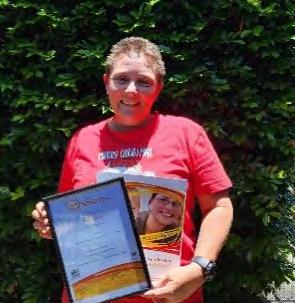
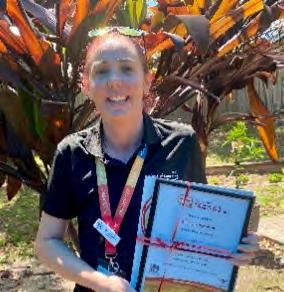
Jessica K: Little Scholars School of Early Learning Redland Bay South - Certificate III (Trainer Brooke Kirkham)
Jessica O: Vickers Road Community Childcare Centre - Diploma (Trainer Lainie Randell)
Jessica W: Bethania Lutheran Kindergarten - Diploma (Trainer Arielle Waples)
Jo Hannah: Tugun Tiny Tots Early Learning Centre - Certificate III (Trainer Sonja Hartley)
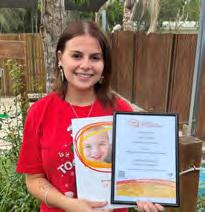
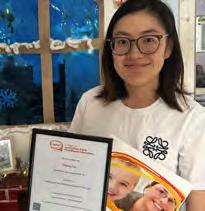
Jodie B: Little Scholars School of Early Learning Redland Bay - Certificate III (Trainer Brooke Kirkham)
Jodie K: Charley’s Place Springwood - Certificate III (Trainer Melissa-Ann Cooper)
Jordan: Raceview Kindergarten and Child Care Centre - Certificate III (Trainer Meaghan Westwood)
Josie: Okinja Early Learning Centre and Kindergarten - Diploma (Trainer Lauren Turrell)
Juanita: Kingston Tiny Tots Early Learning Centre - Diploma (Trainer Brooke Kirkham)
Julie: Educating Kids Childrens Centre Kirwan - Diploma (Trainer Lainie Randell)
Karina: Caboolture Christian Children’s Centre - Diploma (Trainer Lauren Turrell)
Karlee: Bahrs Scrub Early Learning Centre - Certificate III (Trainer MelissaAnn Cooper)
Kendell: Treasure Island Child Care Centre Clifton - Diploma (Trainer Meaghan Westwood)
Kirsty: Smart Start Early Learning Centre - Certificate III (Trainer Meaghan Westwood)
Kiyanah: Bluebird Early Education Waterford - Diploma (Trainer Meaghan Westwood)
Klier: Children’s Choice Early Education Centre - Certificate III (Trainer Meaghan Westwood)
Kristy: Wyreema Early Education
- Certificate III (Trainer Kellie Saville)
Kylie: Edge Early Learning Bellbird Park - Certificate III (Trainer Meaghan Westwood)
Lacey: Wyreema Early Education
- Certificate III (Trainer Kellie Saville)
Lailani: Educating Kids Childrens Centre Townsville - Diploma (Trainer Lainie Randell)
Lana: Genius Childcare Highfields
- Diploma (Trainer Kellie Saville)
Laura: Noahs Ark Kindergarten and Day Care Centre - Certificate III (Trainer Arielle Waples)
Leonie: Busy Bees Mitchelton
- Certificate III (Trainer Lauren Turrell)
Lilian: Community Kids Early Learning
Centre Goodna - Certificate III (Trainer Arielle Waples)
Lisa-Marie: Raceview Kindergarten and Child Care Centre - Diploma (Trainer Meaghan Westwood)
Logan: Early Birds Childcare Jimboomba
- Certificate III (Trainer Arielle Waples)
Mackeely: Bahrs Scrub Early Learning Centre - Diploma (Trainer Melissa-Ann Cooper)
Maddison: Nottingham World of Learning - Certificate III (Trainer Arielle Waples)
Madeline: Early Birds Childcare Jimboomba - Diploma (Trainer Arielle Waples)
Madison: Little Bunyas Early Childhood Centre of Excellence - Diploma (Trainer Melissa-Ann Cooper)
Makayla: A Country Garden Early Childhood Centre Willow HouseDiploma (Trainer Kellie Saville)
Marie: Kinder Cottage Childcare CentreCertificate III (Trainer Sonja Hartley)
Megan M: Country Kids Play & Learning Centre - Diploma (Trainer Lauren Turrell)
Megan S: Little Scholars School of Learning Burleigh - Diploma (Trainer Sonja Hartley)
Mia I: Amazing Grace Early Learning Centres of Holistic Excellence Railway Estate - Diploma (Trainer Lainie Randell)
Mia L: Burleigh Waters Childcare Centre - Certificate III (Trainer Sonja Hartley)

Michelle: Goodstart Early Learning Kirwan Golf Links Drive - Diploma (Trainer Lainie Randell)
Molly: Gatton Child Care Centre
- Diploma (Trainer Kellie Saville)
Naomi G: Wyreema Early Education
- Diploma (Trainer Kellie Saville)
Naomi L: Cannon Hill Early Learning Centre - Diploma (Trainer Brooke Kirkham)
Natalie B: Kindamindi Development and Learning Centre - Diploma (Trainer Lauren Turrell)
Natalie P: Cubby Care Early Learning Centre Beenleigh - Certificate III (Trainer Melissa-Ann Cooper)
Natasha: Little Gems Child Care & Early Learning Centre Jimboomba - Diploma (Trainer Arielle Waples)
Neisha: Goodstart Early Learning Gatton - Diploma (Trainer Kellie Saville)
Nichole: Bahrs Scrub Early Learning Centre - Diploma (Trainer Melissa-Ann Cooper)
Nickyla: Caboolture Christian Children’s Centre - Diploma (Trainer Lauren Turrell)
Nicole: Free Range Kids Laidley
- Certificate III (Trainer Kellie Saville)
Olivia: Play and Learn Upper Coomera - Certificate III (Trainer Sonja Hartley)
Paige: Kookaburra Child Care Centre - Certificate III (Trainer Mandy Walker)
Phoebe: Kindy Cottage Geebung - Certificate III (Trainer Lauren Turrell)
Piper: Willow Early Learning Centre
Arundel - Certificate III (Trainer Melissa-Ann Cooper)
Rakaia: Little Scholars School of Early Learning Stapylton - Certificate III (Trainer Melissa-Ann Cooper)
Rebecca D: Little Bunyas Early Childhood Centre of Excellence - Certificate III (Trainer Melissa-Ann Cooper)
Rebecca I: Busy Bees at Beenleigh - Diploma (Trainer Meaghan Westwood)
Rebecca R: Caboolture Christian Children’s Centre - Certificate III (Trainer Lauren Turrell)
Rebecca S: Bahrs Scrub Early Learning Centre - Diploma (Trainer Melissa-Ann Cooper)
Rhani: Little Characters Early Learning Centre - Diploma (Trainer Lauren Turrell)
Richell: St Lukes Catholic Child Care Centre - Diploma (Trainer Brooke Kirkham)
Ryan: Little Characters Early Learning Centre - Diploma (Trainer Lauren Turrell)
Sally: Nature Kids Childcare - Diploma (Trainer Arielle Waples)
Samantha B: Habitat Early Learning Ferny Grove - Certificate III (Trainer Lauren Turrell)
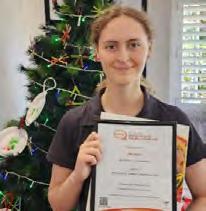
Samantha N: Bella Grace Early Learning Centre Beerwah - Diploma (Trainer Lauren Turrell)
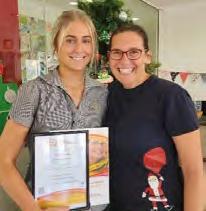
Samantha S: Treasure Island Child Care Centre Clifton - Certificate III (Trainer Meaghan Westwood)
Samara: Little Scholars School of Learning Burleigh - Certificate III (Trainer Sonja Hartley)
Sarah: Tiny Legends Child Care Centre Brighton - Diploma (Trainer Lauren Turrell)
Sasha: Little Scholars School of Learning Burleigh - Diploma (Trainer Sonja Hartley)
Searne: Little Scholars School of Early Learning Redland Bay South - Certificate III (Trainer Brooke Kirkham)
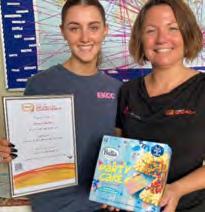
Shaakira: Free Range Kids GattonCertificate III (Trainer Kellie Saville)
Shanaya: Kingston Tiny Tots Early Learning Centre - Diploma (Trainer Brooke Kirkham)
Sharon: Edge Early Learning Pimpama North - Diploma (Trainer Melissa-Ann Cooper)
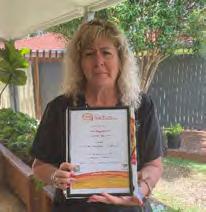
Shay: Tiny Tiger Early Learning Centre Runcorn - Diploma (Trainer Brooke Kirkham)
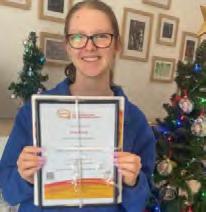
Sheridan: Little Scholars School of Early Learning Ormeau - Certificate III (Trainer Melissa-Ann Cooper)
Sonal: Montessori Garden Early Learning & Childcare Centre - Certificate III (Trainer Pauline Bailey)
Stephanette: Kidi Kingdom Child Care Coomera - Diploma (Trainer Melissa-Ann Cooper)
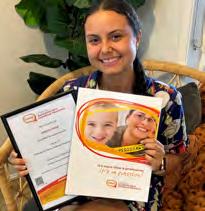
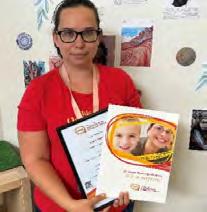
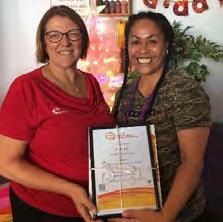
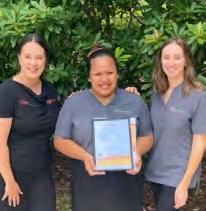
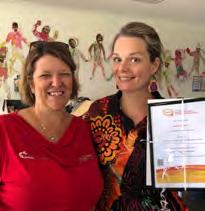
Stephanie F: Imagine Childcare and Kindergarten Collingwood Park - Certificate III (Trainer Meaghan Westwood)
Stephanie L: Eagleby Kids Early Learning - Certificate III (Trainer Melissa-Ann Cooper)
Storm: Little Scholars School of Early Learning Yatala - Certificate III (Trainer Melissa-Ann Cooper)
Suzanne: Living Faith Early Learning Centre Petrie - Diploma (Trainer Lauren Turrell)
Tahlia R: Play and Learn Upper Coomera - Certificate III (Trainer Sonja Hartley)

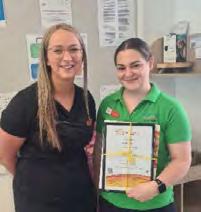
Tallitha: Stretton Early Years and Kindergarten - Diploma (Trainer Arielle Waples)
Tameeka: Little Scholars School of Early Learning Yatala - Diploma (Trainer Melissa-Ann Cooper)
Tamsyn: Munchkins Early Education Centre - Diploma (Trainer Sonja Hartley)
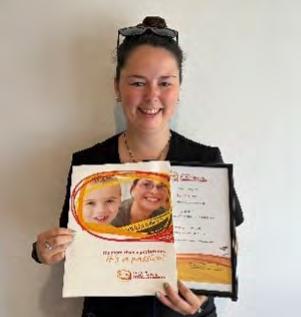
Tayla: My Cubby House - Certificate III (Trainer Sonja Hartley)
Taylee: Plainland Kindergarten and Child Care Centre - Diploma (Trainer Arielle Waples)
Te Huinga: Bright Buttons Little Meadows - Diploma (Trainer Lauren Turrell)
Teagan-Marie: Sparrow Early Learning Browns Plains Village Childcare - Diploma (Trainer Arielle Waples)


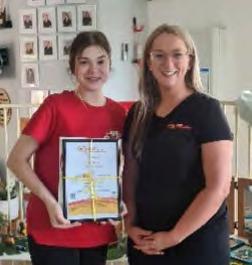
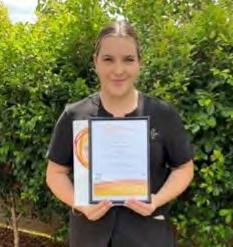
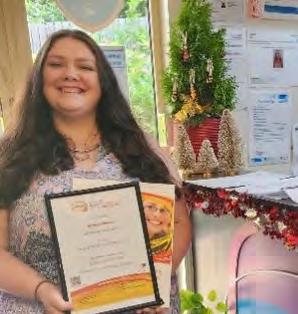
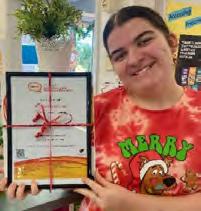
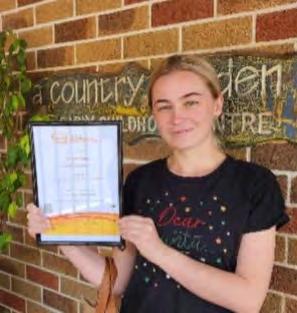
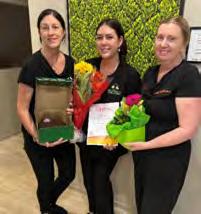
Theresa: Expeditions Early Learning Journey Underwood - Certificate III (Trainer Meaghan Westwood)
Tina: Lockyer Valley Early Education Centre & Pre-School - Diploma (Trainer Kellie Saville)
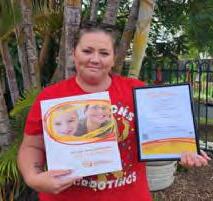
Tracy: Little Aussie Kids Early Learning Centre Slacks Creek - Certificate III (Trainer Brooke Kirkham)
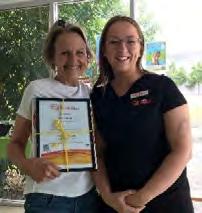

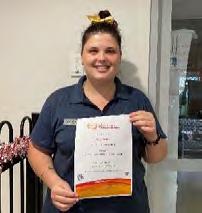
Yihan: Junior Campus Oxenford - Diploma (Trainer Sonja Hartley)
YuanYu: Tiny Tiger Early Learning Centre Runcorn - Diploma (Trainer Mandy Walker)


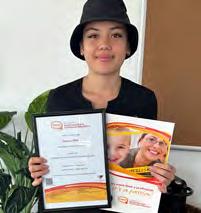
By choosing a career in Early Childhood Education and Care, you are dedicated to providing quality education to children in the development of successful lifelong learning.
The College for Australian Early Childhood Educators (CAECE) is committed to delivering high quality and practical training to the early childhood education and care sector. We currently offer the courses below for those looking to gain qualifications, develop their knowledge and skills, and further their career opportunities. We also offer in-service First Aid and CPR refresher.



CHC22015 Certificate II in Community Services
CHC30121 Certificate III in Early Childhood Education and Care (Skills Assured funded program)
CHC50121 Diploma of Early Childhood Education and Care (Skills Assured funded program)
BSB50420 Diploma of Leadership and Management
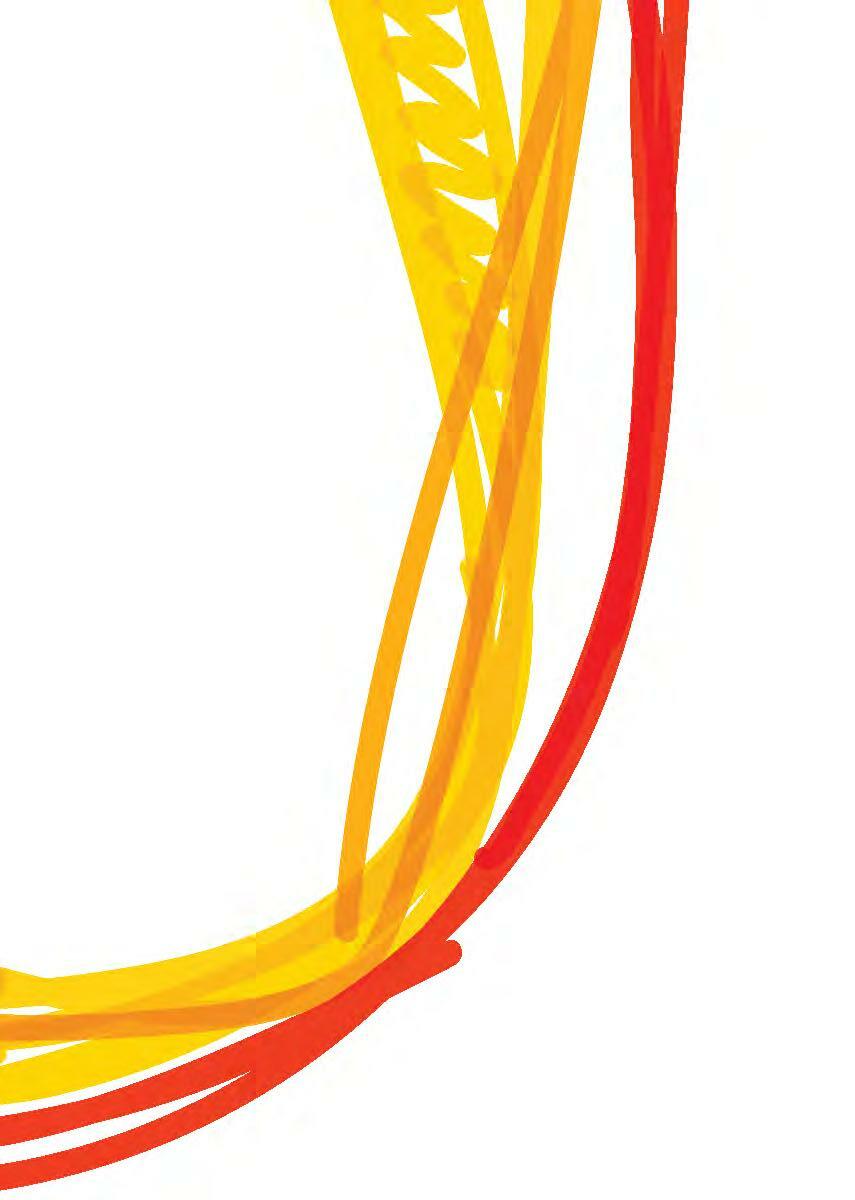

HLTAID009 Provide Cardiopulmonary Resuscitation (in service)
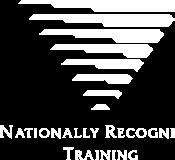
HLTAID012 Provide First Aid in an Education and Care Setting (in service)

You will receive the most supportive guidance and an individual study pathway catered to your needs!

Thank you to all of the team! I have had such a wonderful experience with CAECE and the support given to me was fantastic!
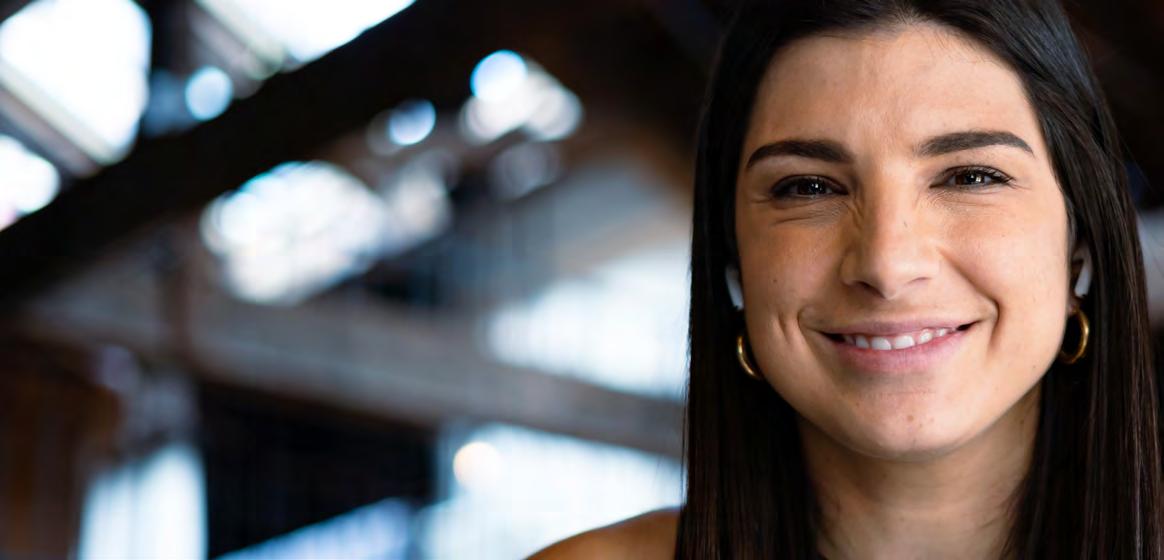





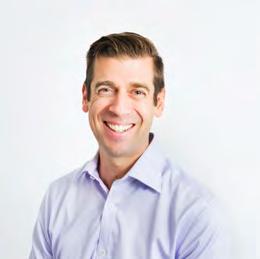

Plus Kelly Goodsir, Adrian Pattra, Tania Porter, and more!


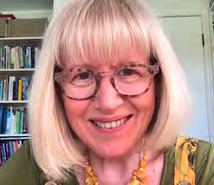



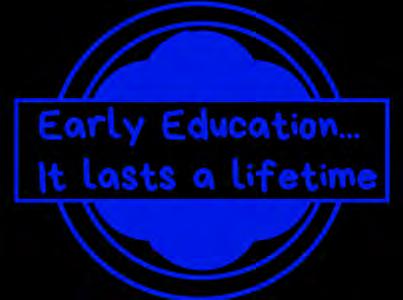

E arly bird rEgistrations and accommodation bookings opEn now !
Join us for an incredible conference weekend which includes a standout lineup of speakers, dedicated Approved Provider Panel Discussion, Workshops and our famous Gala Dinner!